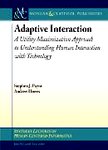版权所有:内蒙古大学图书馆 技术提供:维普资讯• 智图
内蒙古自治区呼和浩特市赛罕区大学西街235号 邮编: 010021

丛 书 名:Synthesis Lectures on Human-Centered Informatics
版本说明:1
I S B N:(纸本) 1608458385;9781608458387
出 版 社:Morgan & Claypool Publishers
出 版 年:2013年
页 数:112页
学科分类:08[工学] 0812[工学-计算机科学与技术(可授工学、理学学位)]
摘 要:This lecture describes a theoretical framework for the behavioural sciences that holds high promise for theory-driven research and design in Human-Computer Interaction. The framework is designed to tackle the adaptive, ecological, and bounded nature of human behaviour. It is designed to help scientists and practitioners reason about why people choose to behave as they do and to explain which strategies people choose in response to utility, ecology, and cognitive information processing mechanisms. A key idea is that people choose strategies so as to maximise utility given constraints. The framework is illustrated with a number of examples including pointing, multitasking, skim-reading, online purchasing, Signal Detection Theory and diagnosis, and the influence of reputation on purchasing decisions. Importantly, these examples span from perceptual/motor coordination, through cognition to social interaction. Finally, the lecture discusses the challenging idea that people seek to find optimal strategies and also discusses the implications for behavioral investigation in HCI. Table of Contents: Introduction: A Framework for Cognitive Science Research on HCI / Background / Signal Detection Theory and Collaborative Diagnosis / Discretionary Task Interleaving / Movement Planning / Multimodal Interaction and Text Entry / E-commerce / Browsing Multiple Documents and Skim Reading / Adaptively Distributing Cognition / E-commerce Feedback / Discussion